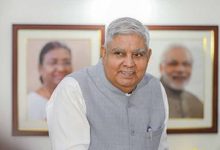Health For All: W.H.O’s Commitment In Platinum Jubilee Year
Special on W.H.O. Day April 7

Dr. ARVIND NERAL
The WHO has placed ‘health for all’ high on the agenda, hoping to drive political and financial commitments from governments. Perhaps mindful of the vagueness that doomed past efforts, W.H.O. has created a new council of economists, health and development experts to advise on the economics of providing everyone with basic health care, including ways to quantify its value. This Year W.H.O. is emphasizing on “Health For All ” to commemorate it’s Platinum Year (1948-2023).
Despite the urgency of the current crisis, the provision of universal health care remains a priority for Tedros Adhanom Ghebreyesus, the director-general of the World Health Organization (WHO). It is also enshrined in the United Nations Sustainable Development Goals on the basis that health is a prerequisite for economic growth. Governments, scientists and the public should support this goal, because it’s in everyone’s best interests. A Focus on specific diseases has derailed efforts to achieve health care for all before. The world must not repeat that mistake in post covid-19 period. Health strategies to tackle post-pandemic scenario is of paramount importance, but it is vital that these do not overshadow the need to ensure that everyone, everywhere has access to basic health care.
The pandemic has amply demonstrated how a lack of reliable health care can render communities vulnerable. Although access to health care isn’t the sole factor that determined how well countries fared, its absence clearly fuelled the flames. Many lives have been lost world-wide because hospitals have been overwhelmed. In the United States, COVID-19 deaths have been higher among people on low incomes, who are less likely to have health insurance and therefore less likely to seek medical care promptly.
It has been almost a century of calls to provide all people with health care, attempts have been stymied by crises and disease-specific interventions. After the economic depression of the 1930s, international health officials working for the League of Nations touted the need for the provision of basic health services by country-wide networks of clinics. This vision was interrupted by the Second World War, but was revived in 1946, when the newly formed United Nations met to write a constitution for the WHO. The constitution stated that health is a human right, and that governments are responsible for the health of their people.
According to Tedros and health-policy experts, the Alma-Ata declaration was undermined by factors including inadequate political leadership, economic crises, political instability and an over-investment in treating individual diseases. Others have suggested that the movement lacked defined steps backed by evidence, as well as cost-effectiveness assessments. Compare this with the UN children’s charity, UNICEF, which in the 1980s vowed to save the lives of four million to five million children a year through well-defined and budgeted programmes to deliver vaccines for diseases including measles, tetanus and polio. Government and philanthropic donors grasped the concept immediately, and UNICEF quickly became one of the larger UN agencies. In 2019, its budget was nearly three times that of the WHO. Childhood immunization programmes save lives, but the lack of investment in strengthening countries’ health systems has led to untold deaths. The answer isn’t to stop vaccinations, of course, but to take cues from the success of UNICEF’s campaign and the failure of Alma-Ata.
In 2019, the WHO once again turned the focus on health care for all, this time at the first UN high-level meeting on universal health care. A corresponding report stated that to provide all people with primary health care, countries, on average, must increase their spending in this area by 1% of their gross domestic product. And world leaders signed a declaration promising to pursue universal health care-in their national context – and provide basic, affordable health services to everyone in the country. To hold them accountable, global-health researchers have created an online portal to track progress towards the attainment of this goal by 2030.
Universal health care might seem a lofty goal amid a crisis, but if we do not push for change now, we will regret it. The pandemic has increased the number of people living in extreme poverty, making them more vulnerable to disease. It’s infected, killed and traumatized health-care workers everywhere, most devastatingly in places that had too few already. “Our failure to invest in health systems doesn’t only leave individuals, families and communities at risk, it also leaves the world vulnerable to outbreaks and other health emergencies.”
(Writer is Professor & H.O.D. Department of Pathology, Pt. J.N.M. Medical College, Raipur ( C.G.) . Views are personal).








